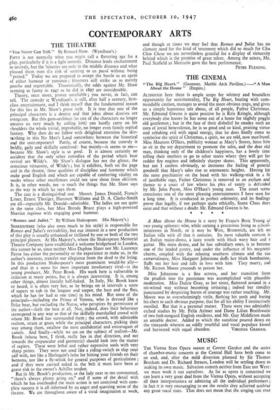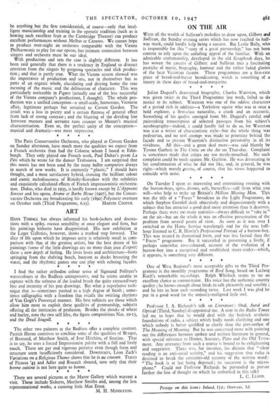MUSIC
THE Vienna State Opera season at Covent Garden and the series of chamber-music concerts at the Central Hall have both come to an end, and, after the mild diversion planned by Sir Thomas Beecham and Dr. Richard Strauss, London will be settling down to making its own music. Salvation cometh neither from East nor West : we must work it out ourselves. As far as opera is concerned we can learn a very great deal from the Vienna Opera, without accepting all their interpretations or admiring all the individual performers ; in fact it is very encouraging to see the results they achieved without any great vocal stars. That does not mean that the singing can ever
be anything but the first consideratioh, of course—only that intel- ligent musicianship and training in the operatic tradition (such as is bearing such excellent fruit at the Cambridge Theatre) can produce excellent performances without Melbas or Carusos. We cannot hope to produce over-night an orchestra comparable with the Vienna Philharmonic to play for our operas, but intimate connection between singers and orchestra must be our ideal.
With production and sets the case is shghtly different. It has been said generally that there is a tendency in England to distract attention from the singers by gorgeous spectacles and slick produc- tion; and that is partly true. What the Vienna season showed was the importance of production and sets, not in themselves but as parts of an organic whole, elucidating and driving home the true meaning of the music and the delineation of character. This was particularly noticeable in Figaro (actually one of the less successful of the Vienna company's productions, I thought). The whole pro- duction was a unified conception—a small-scale, humorous, Viennese affair, legitimate perhaps but unsuited to Covent Garden. The result was a loss in poetry and a certain flatness of general effect from lack of strong contrast ; and the blurring of the dividing line between masters and servants runs counter to Mozart's musical characterisation. Even so, the perfect unity of the conception— musical and dramatic—was most impressive.
*
The Paris Conservatoire Orchestra, who played at Covent Garden on Sunday afternoon, have much more the qualities we expect from a French orchestra than had the Colonne whom I heard at Edin- burgh. They only played one French work, Paul Dukas's poem La Pen i which he wrote for the dancer Truhanova. I am surprised that this music has not been used by the many ballet companies always in search of new works. It is eminently "plastic," I should have thought, and a most satisfactory hybrid, crossing the brilliant colour and exotic melodiousness of Rimsky-Korsakov with the subtleties and exquisitely calculated effects of French impressionistic orchestra- tion. Dukas, who died in 1935, is hardly known except by L'Apprentt Sorcier and his opera, Ariane et Barbe Bleue (1907), but the Conser- vatoire Orchestra are broadcasting his early (1892) Polyeucte overture on October ioth (Third Programme, 6.15). MARTIN COOPER.



































 Previous page
Previous page